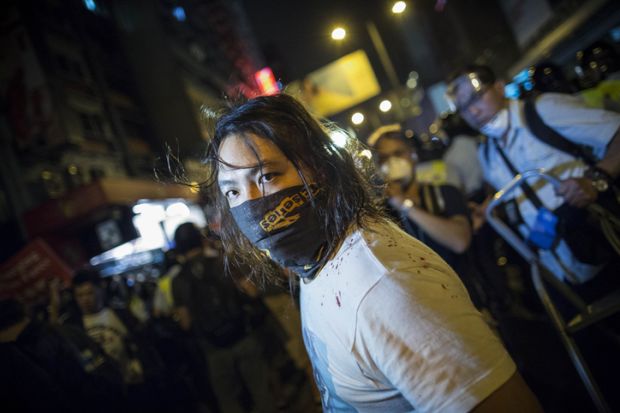It has not been easy to be a Hong Konger over the past six months – particularly if you’re a university student trying to navigate the complex political quagmire and regular, vitriolic disputes penetrating your campus.
The past 10 days have seen the most conspicuous and alarming occurrence of violence on university campuses. Militant protesters have taken to setting up roadblocks, unbridled vandalism and throwing projectiles at vehicles and individuals passing by – all in an attempt, they claim, to extract concessions from Hong Kong’s calcified government. Meanwhile, the police have deployed hitherto unprecedented and often inexplicable levels of force against individuals who may not be directly implicated in the use of violence – if they are involved at all.
More than 2,000 rounds of tear gas and rubber bullets were fired at protesters last week at the Chinese University of Hong Kong (CUHK). And at Hong Kong Polytechnic University this weekend, the violence reached such a pitch that the police mooted the possibility of firing live rounds for the first time in the crisis.
These “sieges” or “occupations” (depending on one’s perspective) of universities reflect the fact that as the city edges closer to Armaggedon, even sites of intellectual and political sanctity are no longer immune from physical conflict. Previously, students predominantly engaged in civil disobedience in the main thoroughfares of the city, while the police force were wary of accusations of intruding on “sacrosanct” spaces of learning. Academic administrators carefully maintained a precarious balance between maintaining empathetic support for affected students and ensuring that campus environments remained as “apolitical” as possible.
The latter strategy has now demonstrably failed. Protesters employed makeshift weaponry during the pitched battles with police at CUHK, and the Hong Kong government responded with an unprecedented escalation of police presence on campus – a move that stoked students’ paranoia and inflamed pre-existing tensions.
Equally worrying is the significant surge in explicitly jingoistic and inflammatory rhetoric from all sides. Mainland Chinese media outlets have focused on incidents in which protesters allegedly targeted or confronted students speaking Mandarin – a language highly distinct from the dominant dialect spoken in Hong Kong, Cantonese, and caricatured by opponents of the Beijing government as the tool of the “public enemy”.
Such incidents have only bolstered the convictions of many Mainland Chinese netizens and students that the ongoing protests constitute a Western-supported operation bent on undermining political stability and order in China.
Meanwhile, the Hong Kong public’s deep opposition to the police operations on university campuses adds to the snowballing list of grievances they harbour against the Chinese state –which is only likely to stoke further resentment from Chinese citizens, who view their core identities and values as under assault.
The on-campus violence seems spontaneous, propelled by emotion and mutual belligerence between the protestors and the police in the wake of incidents such as last week’s burning by protestors of a man who expressed pro-China views, and the death of an elderly bystander who was hit by a brick in the crossfire between pro- and anti-government protesters.
But while universities are inherently political spaces, they should also be places where individuals can speak and think without constraints or impositions. This maxim ought to be borne in mind by both Mainland Chinese and Hong Kong students. It is not in the protesters’ interests to alienate their own academic peers. And while police action is certainly permitted on campus – where Hong Kong law applies no less than anywhere else in the city – there is a fine but important line between necessary law enforcement and the unrestrained exercise of undue force. It is the repeated apparent crossing of this line that any reasonable politician ought to worry about.
Those who break the law must be brought to justice and punished, but it is not within the rights of any non-judiciary figures to apportion vigilante justice in accordance with their own arbitrary standards. University administrators must amplify their disapproval of those who seek to undermine the safety and security of their students – regardless of factions, politics or identities.
Moreover, it is high time that the Hong Kong administration sought to isolate and address individually the plethora of causes for the ongoing crisis. It is foolish for the protestors to advocate solutions that would never pass the baseline test imposed by the Beijing administration: namely, the preservation of law and order and the maintenance of Chinese sovereignty. Yet questions of police conduct, political accountability and, in the context of universities, the protection of students’ rights and welfare merit urgent and thorough responses.
Any attempts at de-escalating the crisis must begin with a ceasefire agreement, followed by structural reforms. Regarding ceasefires, the university campus would be a perfect place to start. If the violence there could demonstrably be halted, with both parties taking a step back, perhaps such a modus operandi could serve as a paradigm for how the wider crisis could be resolved.
Brian Wong is an MPhil candidate in politics at the University of Oxford and editor-in-chief of the student-led Oxford Political Review.




